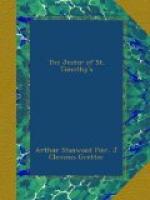At last, after one of the scrimmages, Dennison got up, hobbled a moment, and then sat down again. Collingwood hurried over to him anxiously.
“Wrenched my ankle,” said Dennison. “I guess I’ll be all right in a moment.”
Waring, the Fifth Former, who acted as water-carrier, ran out on the field with his pail and sponge. Mr. Barclay examined the ankle, then turned to Collingwood.
“I think he could go on playing,” he said. “But if I were you I’d take him out now and save him for the St. John’s game. You don’t want to risk his being laid up for that.”
Dennison protested, but Collingwood agreed with Mr. Barclay. He turned and called, “Westby”; and as Westby ran out, Dennison picked himself up and limped to the side-line.
It was Harvard’s ball in the middle of the field. Though it was only the first down, Ballard dropped back to kick.
“Now then, Wes, hang on to it,” Collingwood cried as he and Westby turned and ran to their places in the back field.
Westby had a faint hope that the kick might go to Collingwood; he didn’t feel quite ready yet to catch the ball; he wanted to be given a chance to steady down first. But he knew that was exactly what the Harvard quarterback intended to prevent.
The ball came sailing, high and twisting; he had to run back to get under it. Then he planted himself, but the ball as it came down was slanted off by the wind, so that he had at the last to make a sudden dash for it; it struck and stuck, hugged to his breast, and then over he went with a terrific shock, which jarred the ball from his grasp.
Irving had seen the play with mingled joy and sorrow. It was his brother who had made the tackle; it was Newell, the other Harvard end, who had dropped on the fumbled ball.
Westby and Lawrence got to their feet together; Lawrence’s eyes were dancing with triumphant expectation; the ball was Harvard’s now on St. Timothy’s twenty-yard line. And Westby went dully to his position, aware of the accusing silence of the crowd.
“All right, Wes; we’ll stop them,” Collingwood said to him cheerfully.
Westby did his best and flung himself desperately into the thick of every scrimmage. The whole team did its best, but Harvard would not be denied. By short rushes they fought their way down, down, and at last across the goal line—and the game was won. There were only three minutes left to play, and in that time neither side scored.
When Mr. Barclay blew his whistle, the Harvard team assembled and cheered St. Timothy’s, and then St. Timothy’s assembled and cheered Harvard. After that the players walked to the athletic house, beset on the way by the curious or by friends.
Westby was the victim of condolences, well meant but ill-timed; he responded curtly when Blake, pushing near, said to him, “It was awfully hard luck, Wes—but after that you played a mighty good game.” He wished nothing but to be let alone, he wished no sympathy. He knew that he had lost the game; that was enough for him.




